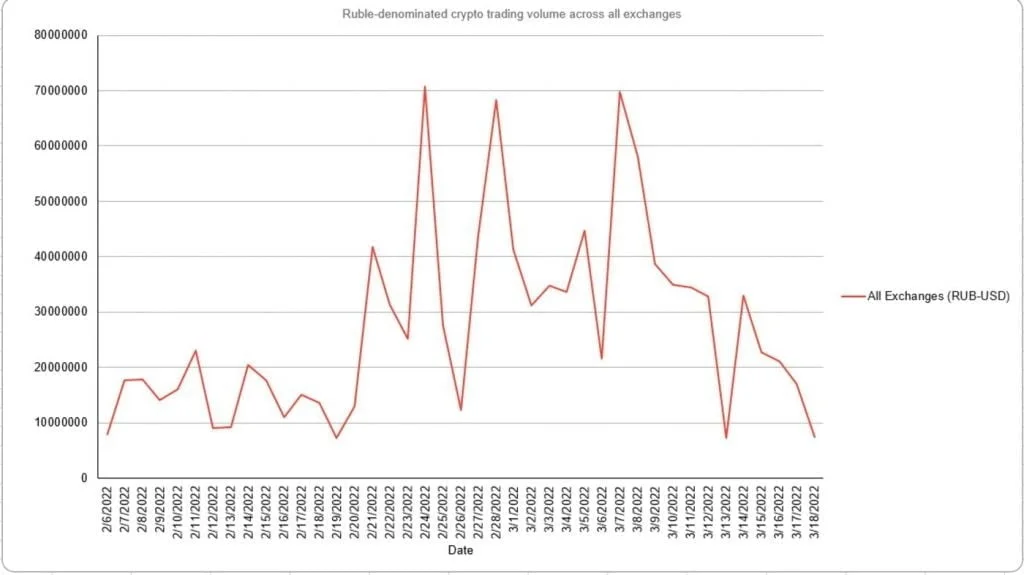Christine Lagarde has in recent times labeled cryptocurrency as a “threat” to global security, but her perception seems to be in contrast with the real-world data, as well as expert views.

Christine Lagarde, the President of the European Central Bank, has underlined her concerns that Russian individuals and businesses are evading sanctions by crypto trading.
According to data from Chainalysis, daily rubble-denominated crypto trade volume was barely $7.4 million on March 18, down more than 50% from recent records and a high of $70 million on March 7.
This amount is a sliver of the whole global crypto market volume, with Bitcoin’s total daily volume ranging between $20 billion and $40 billion daily.
The crypto skeptic Lagarde remarked that “volumes of rubles into stable, into cryptos, at the moment [is] at the biggest level that we have seen since maybe 2021” during a presentation at the Bank for International Settlements Innovation Summit on Tuesday.
Lagarde did not blame the Russian government, instead stating that it was mostly Russian citizens and enterprises that were adopting cryptocurrency. Cryptocurrencies, on the other hand, are “definitely being utilized as a tool to try to avoid the sanctions,” she said.
“So is it [crypto] a threat? Yes. Has it … been a threat in the past? Yes, because when you look at a lot of the dubious transactions that are taking place, a lot of the criminal activities payments that are taking place, very often you find some crypto assets.”
Lagarde’s views appear to be at conflict with Chainalysis and Kaiko’s data, as well as expert opinion. According to Jake Chervinsky of the Blockchain Association, Russia is unlikely to use crypto assets to get over Western sanctions.

According to data from crypto monitoring firm Kaiko, the volume of the ruble to USDT has dropped 86 percent from a high of $38 million on March 7 to less than $5 million on March 22. There was a spike in the weeks leading up to the war and a subsequent spike, but volumes are now back to levels observed throughout most of early February. That was before the imposition of sanctions.
On the other hand, cryptocurrency is assisting Ukrainian migrants in escaping the nation. CNBC reported on a Ukrainian immigrant known only by the pseudonym “Fadey” who escaped the country with $2000 in Bitcoin stored in a cold wallet, making it significantly easier for him to access his funds after he arrived in Poland.
Trying to withdraw money from Ukrainian banks in the weeks leading up to the invasion, according to Alex Gladstein, chief strategy officer for the Human Rights Foundation, was extremely difficult, highlighting the difficulties faced by refugees currently attempting to access their funds from countries such as Poland.
According to data from Merkel Science, cryptocurrency donations to Ukraine have increased dramatically over the last three months, with total daily payments to Ukraine now totaling $100.9 million.
